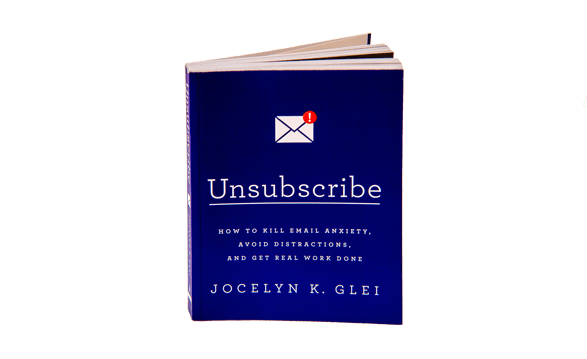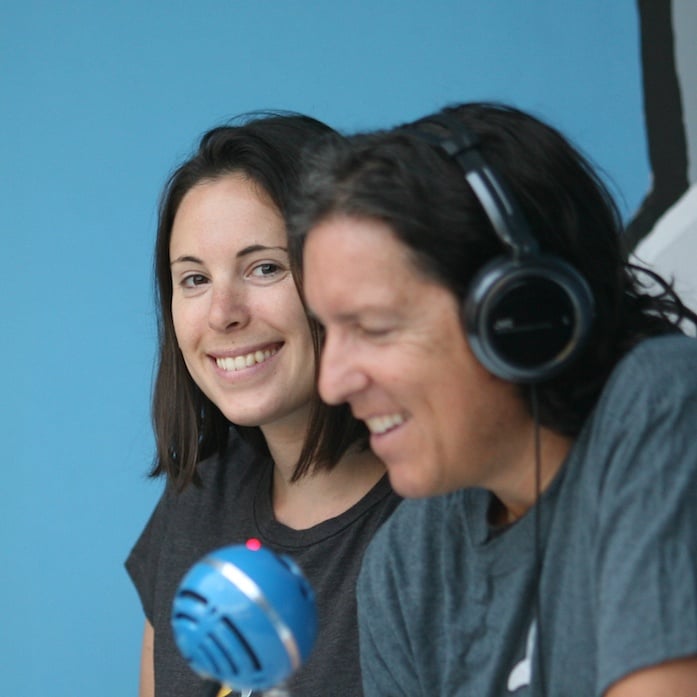
Jocelyn K. Glei
Author
Unsubscribe:
How to Kill Email Anxiety, Avoid Distractions, and Get Real Work Done
In this episode of Helping Sells Radio we talk to Jocelyn K. Glei, author of the book Unsubscribe: How to Kill Email Anxiety, Avoid Distractions, and Get Real Work Done, about managing our time more effectively, overcoming email addiction, and how getting real work done is the new competitive advantage.
We took a slight departure from our usual software adoption topic to discuss an issue that impacts most of us: being more effective at work. We spend all of our time on the show talking to guests who can help us help our customers be more effective at achieving their outcomes. In this episode, we want to help you achieve your outcomes. The topic in this episode is how to be better at managing distractions at work, and in particular how to get control of our email inbox rather than let our inboxes control us.
Idea execution is the new competitive advantage
Idea generation is not usually the problem. People have lots of ideas. The problem is usually in idea execution, says Glei. After all, people are juggling a myriad of tasks and projects, dealing with disruptions and interruptions, and all of these things are getting in the way of people executing on their ideas. In her research, Glei realized that email seemed to be the granddaddy of distractions at work, and she concluded that one's ability to focus and manage one's time effectively and overcome this email addiction is a competitive advantage in the workplace.
This was all inspiration for writing Unsubscribe. And we are glad she wrote it.
Glei talked about three core principles in her book:
- The psychological aspect of why we are addicted to email. There is some science to it, and it has to do with unknown and variable rewards of receiving messages from people.
- Building more effective habits for managing email, or rather for managing our time. Glei shares different methods for how to do this, namely to start the day accomplishing meaningful work first.
- How to write messages that get people to respond and to reduce all the email back and forth. This is where Glei gets very specific with techniques for communicating so much more effectively that email exchanges are minimized. This part of the book is worth the price all by itself.
The problem is that we have a negativity bias
One of the main problems with email is that people have a negativity bias, which means that between the time a message is sent and it is received, messages can get downgraded. As Glei describes it, if I send an email and have positive feelings about it, the receiver likely will have neutral feelings about it. If I send a message about which I have neutral feelings, the receiver likely will have negative feelings about it. This is the negativity bias.
Click-to-Tweet
It happens because there is no social feedback loop with written communications like there is when we talk on the phone or in person. We don't see people's facial expressions or hear their vocal tone, and it is easy to misunderstand people's intentions. Often more messages are sent back and forth clarifying people's intentions.
That means we have more emails to deal with.
Empathy in email makes us more efficient
So as we move towards predominantly electronic (written) communications, we have to be conscious of overcoming this negativity bias, says Glei.
How, exactly?
Empathy.
Empathy can make us more efficient. Glei cites some research from BoomerangApp about how writing with emotion will increase responses to your emails. Yes, we did ask Glei about emoticons and emojis and how they can help. It turns out there is a place for using emoticons, but probably not when you are applying for a job. The point of writing with emotion is to overcome the negativity bias by proactively providing social feedback so receivers better understand your email and can respond more efficiently. And with fewer messages.
Begin the day with meaningful work
One problem with email is that the messages in our inbox can decided for us what we do with our day. We check emails and start responding or worrying or working on tasks assigned to us in these messages, preventing us from accomplishing important work we planned to accomplish that day. Glei suggests in her book that the best thing to do is begin each day working on planned, meaningful work. Even if it is only the first 45 minutes or an hour. Because once we open the Pandora's Box of email, we too easily get diverted.
Batch. Don't nibble.
We challenged Glei on her advice, channeling those who would say, "Well, that won't work for me. I need to check email at the beginning of the day. I cannot miss emails from my manager or from my customers."
Once one comes up with advice, people come up with reasons why it won't work for them.
Glei had good advice here stating that any of these techniques need to be tailored for one's circumstances. Everyone is different and every workplace is unique. But no matter how one adapts the advice, Glei cautions, one must batch email instead of nibbling at it all day.
Research shows that the more people nibble at their email all day, the more stressed and less productive they are. People need to figure this out. If they do need to start their day checking email....they should spend a solid hour focused on reading, resolving, and responding to messages all at once, then close it down and move on to that "meaningful work" project they have due on Friday.
Lots of tips, techniques, and advice
Of course we talked a lot with Glei about tips for more effective messaging. Here are just a few.
- Only do opt-in introductions. Before you introduce someone to a 3rd party, make sure the 3rd party agrees to receive the introduction. Not only is this polite, but it could cut down on unnecessary messages.
- When offering criticism or constructive feedback over email use the word "Yet." Glei cites research from Carol Dweck. Instead of saying, "You are not good a negotiating," say, "You are not good at negotiating, yet."
- Scheduling meetings over email is brutal. Try to close the conversation by giving people enough information in the email about dates and times so that the other person can just say yes to a time, so the conversation can end. Stop all the back and forth.
- Use a scheduling tool like Calendly or x.ai to reduce time and messages just to schedule meetings.
- If you think the bots are any better at reducing the seemingly endless back and forth of scheduling emails, you might be wrong. Bots are just as bad as we are at the moment. Here is the link to the article Glei talked about...the two guys who used AIs to schedule meetings with each other and concluded that even the AIs had too much back and forth: A Conversation Between Two AIs. They used a.xi.
Learn more about Jocelyn Glei's Work
Image credit: http://jkglei.com/unsubscribe/
Tell us what you think of Helping Sells Radio
You could:
- Write a review on iTunes.
- Tweet us using the hashtag #HelpingSells
- Comment below.
Thanks for listening to the show.





